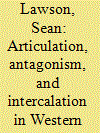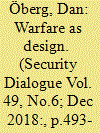| Srl | Item |
| 1 |
ID:
104024


|
|
|
|
|
| Publication |
2011.
|
| Summary/Abstract |
This article provides a discursive grounding for understanding the construction of military imaginaries by adding the concepts of 'antagonism' and 'intercalation' to articulation theory. By examining the cases of industrial-mechanized warfare theory and network-centric warfare theory through the lens of this expanded articulation theory, it is argued that military imaginaries often serve to define and link conceptions of science, technology, society, economy, war, and military organization, thought, and practice into a unified image of the larger security environment - that is, the military imaginary. Military imaginaries often share a common narrative structure that privileges co-periodized change among the elements of the articulation, resulting in the phenomenon of 'antagonism' serving as a generic threat used to justify military modernization and even the use of force.
|
|
|
|
|
|
|
|
|
|
|
|
|
|
|
|
| 2 |
ID:
162416


|
|
|
|
|
| Summary/Abstract |
This article argues that the politics of contemporary Western warfare finds an important reference point in discourses on military design. In the 2010s, military design has become a trending topic in military discourses on command and planning methodology. Since Clausewitz, warfare has been considered a phenomenon characterized by a tension between creativity and linear planning, and the ideal commander as someone with the vision to overcome this. By mapping and analyzing tactical, operational, and strategic narratives and practices, the article illustrates how they emphasize a warfare based both on experimentation and artistry and on traditional operational planning. In so doing, military design relies on reductive military concepts to push the tension identified by Clausewitz towards its extreme end-point, idealizing creativity as an objective of warfare. The article ends by asking to what extent military design risks spilling over into other dimensions of social and political life. It concludes that in pushing creativity as part of war, military design builds on and justifies transgressive political practices with the risk of becoming a vital aspect of future governing.
|
|
|
|
|
|
|
|
|
|
|
|
|
|
|
|